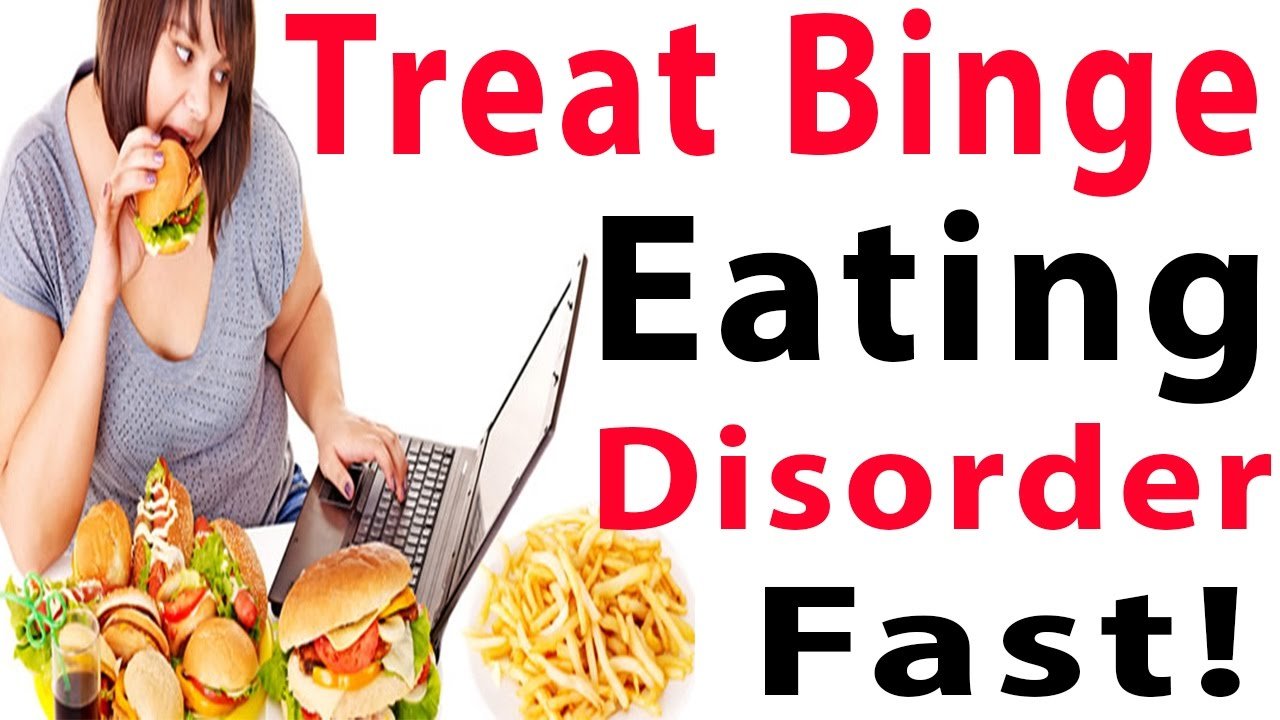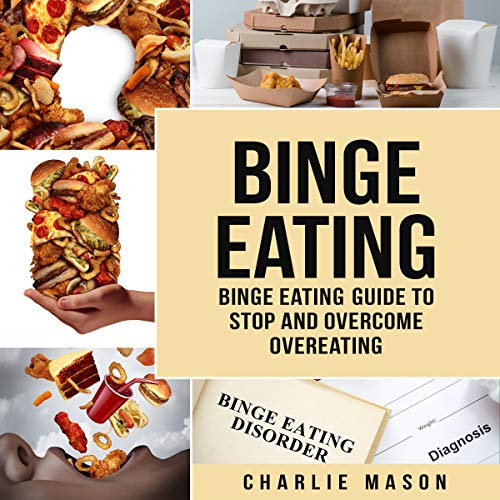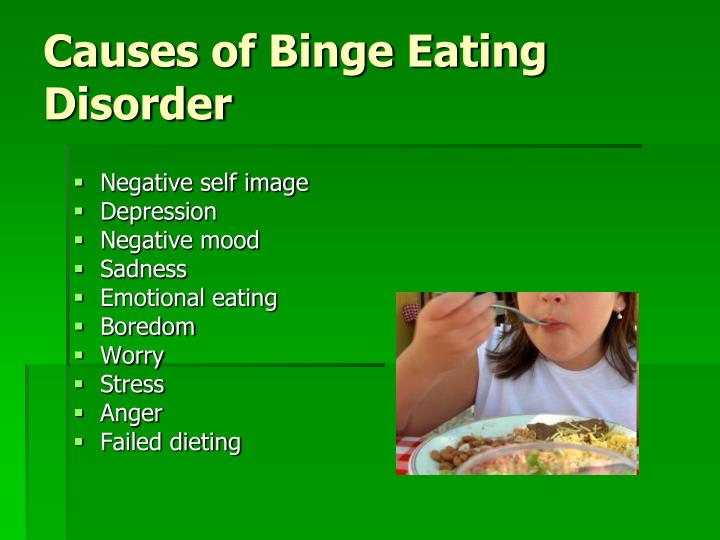Symptoms Of Binge Eating Disorder
There are a number of signs and symptoms that suggest someone might have the condition and needs to seek help.The two key features of binge eating disorder are:;
- eating a very large amount of food in a short period of time
- feeling a sense of loss of control while eating .
These episodes occur frequently, and involve portions of food larger than would simply be considered overeating.;
What If My Gp Is Focused More On Weight Loss Than On The Thoughts And Feelings Behind The Illness
Binge eating disorder is a mental illness, and the weight gain you might experience is a symptom. While sometimes people mention unrelated weight changes as a factor in them developing an eating disorder, its very unlikely that this would be the sole and direct cause. Simply focusing on weight loss doesnt address the root of the illness.
The NICE guidelines state that weight loss isnt the intended goal of the therapies recommended to treat binge eating disorder. In fact, NICE recommends that therapy should involve advising against trying to lose weight during treatment through methods such as dieting, because this can make people feel the urge to binge eat. Treatment for any eating disorder should always address the underlying causes and the thoughts and feelings that cause issues around food and eating.
Remember, you have a right to good quality treatment. If youre struggling to get it, its okay to ask if you can see a different GP. You can also look into self-referral in your area.
Learn To Tolerate The Feelings That Trigger Your Binge Eating
The next time you feel the urge to binge, instead of giving in, take a moment to stop and investigate whats going on inside.
Identify the emotion youre feeling. Do your best to name what youre feeling. Is it anxiety? Shame? Hopelessness? Anger? Loneliness? Fear? Emptiness?
Accept the experience youre having. Avoidance and resistance only make negative emotions stronger. Instead, try to accept what youre feeling without judging it or yourself.
Dig deeper. Explore whats going on. Where do you feel the emotion in your body? What kinds of thoughts are going through your head?
Distance yourself. Realize that you are NOT your feelings. Emotions are passing events, like clouds moving across the sky. They dont define who you are.
Sitting with your feelings may feel extremely uncomfortable at first. Maybe even impossible. But as you resist the urge to binge, youll start to realize that you dont have to give in. There are other ways to cope. Even emotions that feel intolerable are only temporary. Theyll quickly pass if you stop fighting them. Youre still in control. You can choose how to respond.
For a step-by-step guide to learning how to manage unpleasant and uncomfortable emotions, check out HelpGuides free Emotional Intelligence Toolkit.
Read Also: Are Phobias Genetic Or Learned
What Causes Binge Eating Disorder
No one knows the exact cause of binge eating disorder. Like other forms of addiction, binge eating disorder is thought to occur when palatable foods trigger the release of the feel-good hormone dopamine in the brain.;
Over time, the brain of people with eating disorders becomes to adapt to high dopamine levels, and it requires more food to continue feeling good. Scientists also believe that BED may occur from a complex association between your:
- Genes
- Unhealthy eating habits, such as skipping meals, eating too little, or avoiding certain foods
Notably, medical studies have revealed that binge eating disorder may occur with:
- Bipolar disorder
- Depression
- Bulimia nervosa
- Anxiety
Bed Research: What Do We Know

Since Binge Eating Disorder was first mentioned in the second edition of the Diagnostic and Statistical Manual of Mental Disorders in 1987, research on BED has come a long way in a relatively short period of time. In fact, in 2013, BED was added to the latest, fifth edition, of the DSM as its own diagnosis.
Recommended Reading: How To Handle Eating Disorders
How Bed Affects Your Health And Well
BED stems from, and can cause, a variety of emotional, physical, and psychological issues. You may ultimately experience physical complications such as:
- High blood pressure
You may also experience psychological and emotional conditions that are often linked with BED, including:
- Feeling bad about yourself or your life
- Poor quality of life
- Problems functioning at work, in your personal life, or while socializing
- Anxiety, depression, bipolar disorder, and substance abuse disorder
Treatment For Binge Eating Disorder
Binge eating disorder is a serious mental illness where people experience a loss of control and eat large quantities of food on a regular basis. It can affect anyone of any age, gender, or background.;Read more about BED.
If youre worried that you or someone you know is suffering from binge eating disorder, its important to get treatment as early as possible to ensure the best chance of recovery. The first step is usually to book a GP appointment. It can be difficult to talk about your illness with a doctor, but remember, it is an illness, and it is every bit as serious as any other eating disorder. Its not your fault, and you deserve help to get better.
Evidence-based guidelines from the National Institute of Health and Care Excellence are clear about what is best practice when treating binge eating disorder. Healthcare professionals should consider these guidelines when looking at your needs and deciding on a treatment pathway.
Also Check: Is It Possible To Have Ptsd From Relationships
Enhance The Public Health Impact Of Current Treatments
There is a need to translate evidence-based treatments for BED into clinical settings in order to increase access to care. Although there are robust treatments for BED, their use in clinical practice is relatively scarce . Dissemination and implementation science will enable the identification of the most effective strategies for training practitioners and implementing treatments in diverse clinical settings in a sustainable manner. For example, researchers may examine the relative effectiveness of traditional training models versus models that promote systemic change , to identify which will most likely increase adoption, penetration, and sustainability of treatments.
Furthermore, the potential for telecare, the internet, and other technologies to enhance access to treatments for BED is a burgeoning area of research. For example, one study found that email bulimia therapy was more effective than self-directed writing and a wait-list control in reducing binge eating . Internet-based CBTgsh has also shown preliminary efficacy , and other technologies such as texting and daily electronic diaries have shown efficacy for problems such as smoking and obesity . Such studies demonstrate that scalable therapies for BED may be as effective as more intensive treatments. However, relatively high attrition rates seen in such therapies must be addressed effectively by, for example, enhancing treatment engagement and adherence .
Group And Family Therapy
Family support is very important to treatment success. It helps your family members understand your eating disorder and recognize its signs and symptoms so they can support you better.
In group therapy, you can find support and openly discuss your feelings and concerns with others who share common experiences and problems.
Recommended Reading: How Do Psychiatrist Diagnose Bipolar
Immerse Yourself In Joyful Activities
OK, lets move away from this intensive focus on your weight and shape to evaluate your self-worth and start looking at other aspects of your life.
If you can broaden your scope of self-evaluation by increasing the importance of other life areas, your need to diet may diminish and with it, your binge eating episodes.
How to do it? Think about activities that make you happy, bring you joy, and that interest you.
Some examples could be.
- Taking up Quidditch
- Building puzzles
Make a list of these as long as possible. Be creative!
Which one are you going to commit to trying?
The point of these activities is to give more meaning in your life, independent of weight and/or shape cues.
Eventually, if you devote enough energy to these activities, you may start to realize what the more important things are in life. Your craving to control your weight and shape could diminish. Once it does, this will undoubtedly have a positive effect on your eating behaviour.
Keep A Food And Mood Journal
Keeping a food and mood journal that tracks what you eat and how you feel can be an effective tool. It can help identify potential emotional and food triggers and promote healthier eating habits.
One study in 17 people showed that using an online self-help program that involved keeping a food diary was associated with fewer self-reported episodes of binge eating .
Several other studies also suggest that tracking your intake may be linked to increased weight loss and aid long-term weight management .
To get started, simply start recording what you eat and how you feel each day using either a journal or app.
Summary Food and mood journals can help identify triggers to address potential problems. Studies show that using a food diary is associated with fewer episodes of binge eating, as well as increased weight loss.
Read Also: Can Eating Disorders Stop Your Period
Health Concerns Of Those With Bed
Aside from embarrassment and extreme discomfort from binge eating, there are several health concerns that could develop as well.
Diabetes and heart disease are the most well-known as they are often linked to obesity.
In addition, people with binge eating disorder will experience fatigue, shortness of breath and trouble doing any type of physical activity.
Since their body is under so much stress, they will usually have a hard time getting a good nights sleep as well.
All of these concerns together would lead to a rapid decline in quality of life.
Unfortunately, unless the individual gets help, developing disease will either slowly kill them over time. Its also known that some types of cancers can develop from BED.
This is caused from abnormal cell growth in response to your bodys reaction to dealing with the internal stress of constant overeating.
Aside from health, relationships may also suffer with someone struggling with BED.
This could partly be because they may avoid gatherings but also because they may be ashamed of their disorder and push their loved ones away.
If an individual feels safe, understood and not judged, they will be much more likely to open up about their struggles.;
What Causes Binge Eating

As with most mental disorders, there is not one specific cause of Binge Eating Disorder. There are many psychological, social, and biological factors that can contribute to BED development. For example, negative affect is commonly associated with BED, leading many researchers and professionals to believe that binge-eating episodes are triggered by negative affect and provide relief from them . Individuals that struggle with emotion regulation and emotional awareness also appear to have an increased likelihood of BED behaviors . Interpersonal and social issues can also result in BED diagnoses. Further, research seems to clearly indicate a relationship between reward sensitivity as well as impulsivity, making one more susceptible to BED behaviors.
You May Like: A Hospital Patient Was Diagnosed As Suffering From Schizophrenia
This Is The Practice Of Self
As you relate to yourself with empathy and a kind perspective, you become more able to ask yourself what do I need right now? and you become more able to take care of yourself as a natural response to the pain your heart is in.;
This space, where we are present with our suffering but not judgmental towards it, becomes our inner resource with practice.;
Its how we become available to others even in the toughest times, and how we can continue onwards towards vitality and life while keeping our humanity intact, even despite seemingly insurmountable challenges that are outside of our control.
Tip : Support Yourself With Healthy Lifestyle Habits
When youre physically strong, relaxed, and well rested, youre better able to handle the curveballs that life inevitably throws your way. But when youre already exhausted and overwhelmed, any little hiccup has the potential to send you off the rails and straight toward the refrigerator. Exercise, sleep, and other healthy lifestyle habits will help you get through difficult times without binge eating.
Make time for regular exercise. Physical activity does wonders for your mood and your energy levels, and its also a powerful stress reducer. The natural mood-boosting effects of exercise can help put a stop to emotional eating.
Get enough sleep every night. When you dont get the sleep you need, your body craves sugary foods that will give you a quick energy boost. Sleep deprivation may even trigger food addiction. Getting plenty of rest will help with appetite control and reduce food cravings, and support your mood.
Connect with others. Dont underestimate the importance of close relationships and social activities. Youre more likely to succumb to binge eating triggers if you lack a solid support network. Talking helps, even if its not with a professional.
Manage stress. One of the most important aspects of controlling binge eating is to find alternate ways to handle stress and other overwhelming feelings without using food. These may include meditating, using sensory relaxation strategies, and practicing simple breathing exercises.
Don’t Miss: What Is Emotional Eating Disorder
Binge Eating Disorder: When Comfort Eating Crosses The Line
Eating for comfort or emotional reasons is not necessarily a bad thing. That is as long as the food does not become the main source of comfort or method for dealing with lifes stress and challenges. Using food to consistently soothe emotional upheaval can quickly become Binge Eating Disorder, and this can result in some serious health consequences.
Take A Look At When And Why You Binge
When we work with people with binge eating disorder, we see them living in environments that can promote overeating. For example, bingeing often happens in the evening, after a long day, when we are alone and possibly watching TV .;Setting up our environment is essential to increase success in stopping a binge, but where do you start? You can start by asking yourself some important questions:;
- What does it look like when I binge?;
- What am I feeling before, during and after a binge?;
- What triggers me to binge?
- How do I typically overeat?;
- Where does this happen?
Once youve answered these questions, there are several things you can do.;Lets say that TV watching is often a trigger for you. Maybe you start by changing this behavior to eat at a table, with a plate, while sitting on a chair . As you eat, be mindful about it. Use your senses while eating the food. This prevents numbing out and mindless eating .;Structuring your environment in this way can promote eating meals without bingeing. Doing this repeatedly can increase your chances of success in this realm.;Another beneficial practice that can help you reduce binge eating episodes is to take a look at the data before and after a binge. Start by asking yourself:;
- What happened before I started bingeing?;
- What was I feeling before, during and after the binge?;
- Did something happen today that made me more vulnerable to my emotions?;
- How did I eat this meal or snack?;
- Where did I eat and what else was I doing at the time?
Also Check: How To Make Your Dog A Service Dog For Anxiety
How To Treat Binge Eating With Talk Therapy
This article was co-authored by Paul Chernyak, LPC. Paul Chernyak is a Licensed Professional Counselor in Chicago. He graduated from the American School of Professional Psychology in 2011.There are 9 references cited in this article, which can be found at the bottom of the page. This article has been viewed 4,098 times.
Binge eating disorder is characterized by eating large amounts of food at one time. You may feel out of control when you binge eat, eat faster than normal, eat until feeling uncomfortably full, and then feel embarrassed, ashamed, or disgusted afterward. Its important to get treatment for binge eating disorder, and talk therapy can be an effective way to treat binge eating. Find a therapist who uses a therapeutic style you feel you can benefit from, and that can help you with specific goals you have.
What If My Gp Isnt Familiar With Binge Eating Disorder Or Doesnt Feel That Its As Serious As Other Eating Disorders
Like all other eating disorders, binge eating disorder is a serious mental illness, and should be treated as such. People with binge eating disorder need and deserve treatment and support. Binge eating disorder has a clear, evidence-based treatment pathway recommended by NICE.
The NICE guidance that People with eating disorders should be assessed and receive treatment at the earliest opportunity applies in all cases. The earlier you can get treatment for your illness, the better your chance of recovery.
Read Also: Can You Have A Panic Attack While High
What Is Binge Eating And What Is Causing It
Put simply, binge eating is eating uncontrollably. There are two types of binge eating episodes: objective binge eating and subjective binge eating1Fairburn CG. Overcoming binge eating. London, UK: Guilford Press 2013..
With more than one in 20 people engaging in binge eating, this isnt a problem affecting just a few.
What Is The Difference Between Bed And Bulimia

Bulimia is characterized by overeating and purging, or trying to compensate for consuming too many calories by vomiting, using laxatives or overexercising. If you have BED, you dont routinely use any of these methods to try to undo any weight gain you might experience from overeating. But even though it is uncommon, you can have BED and not be overweight, thanks to your individual genetic makeup or a particularly fast metabolism.
You May Like: Which Phobia Means You Have An Intense Fear Of Halloween
Using A Complementary Approach